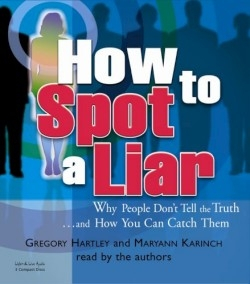How to Spot a Liar
Why People Don't Tell the Truth and How You Can Catch Them
“Knowledge is power” may sound cliché, but that’s the crux of what the authors present in these three discs with one intriguing title. Why is knowledge so powerful? Because it gives an advantage. And advantage is what it’s all about, in dealing with others in personal or professional relationships. The authors—in this audio recording of their 2005 book by the same name—outline skills that most people already possess, but they bring an increased awareness and additional tools to help detect untruths.
Hartley, a former military interrogator with the U.S. Army and a body-language expert, draws on his professional background as he applies military techniques to the civilian world. Karinch is an author and the founder of a Colorado-based literary agency with eight other books to her credit.
According to the authors, there are four types of lies: by omission, by commission, embellishment, and transference. Lying by omission is purposely leaving out details, while commission is a simple denial or wrongful affirmation. Embellishment means adding a little more than what is really true, and transference is to “take a slice of someone else’s truth and make it your own.”
The authors alternate reading their book, with Hartley speaking the majority of the time. That they are male and female works to their benefit, as when Hartley mentions that sometimes people lie out of politeness. Karinch facetiously offers an example, “Honey, do these pants make my butt look big?”
Stress mannerism pointers and personality type-casting provide background and lead up to the actual “interrogation” phase, which Hartley likens to a hospital stay. Some important steps here include establishing control (“put patient on gurney”), establishing rapport (anesthesia), and the questioning phase (“extract the pieces you want”). There is a lot of interesting and in-depth material here, but the audio format can make it difficult to follow consistently. Later chapters address the business setting, including helpful tips for that all-important job interview.
The authors do note that “two different people can remember the same event two different ways,” so sometimes the “truth” isn’t what it appears to be. No doubt.
Disclosure: This article is not an endorsement, but a review. The publisher of this book provided free copies of the book to have their book reviewed by a professional reviewer. No fee was paid by the publisher for this review. Foreword Reviews only recommends books that we love. Foreword Magazine, Inc. is disclosing this in accordance with the Federal Trade Commission’s 16 CFR, Part 255.

